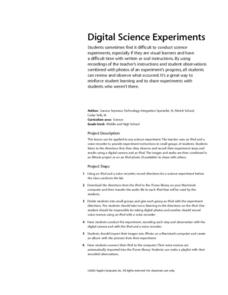Federal Reserve Bank
Banking on Debit Cards
What are the advantages and disadvantages of using a credit card versus a debit card? What are the costs of using a debit card irresponsibly? Here you'll find a lesson on key concepts that every learner should know...
Federal Reserve Bank
Savvy Savers
What are the benefits and risks of saving in an interest-bearing account? Pupils explore concepts like risk-reward relationship and the rule of 72, as well as practice calculating compound interest, developing important personal...
Federal Reserve Bank
To Rent-to-Own or Not to Rent-to-Own?
Explore the key elements of a contract with your young adults, and delve into the features and unique benefits of a rent-to-own contract through discussion and worksheet practice.
Federal Reserve Bank
Measuring the Great Depression
Young historians examine the cost of goods and services through the Consumer Price Index (CPI), output measured by Gross Domestic Product (GDP), and unemployment measured by the unemployment rate to gain an understanding of the economic...
Curated OER
Breaking the Chains, Rising Out of Circumstances
Discuss the history of slavery by analyzing historic photography depicting slavery. Learners write fictional stories based on these photographs. This is a creative and motivating way to launch a discussion of these topics.
NOAA
Plate Tectonics II
Mid-ocean ridges, rift valleys, island arcs, mountain ranges, earthquakes, volcanoes ... there are so many features associated with plate tectonics. The 14th installment of a 23-part NOAA Enrichment in Marine sciences and Oceanography...
NOAA
Invertebrates
Crabs and lobsters ... yum! The 18th installment of a 23-part NOAA Enrichment in Marine sciences and Oceanography (NEMO) program focuses on invertebrate marine life. After the lecture slideshow, learners conduct an activity to sample...
Curated OER
Forest Habitat Fragmentation
Seventh graders discuss the loss of animal habitats and the importance of refuge areas for them. They collect small pictures of animals found in their state and glue them to an outline of their state according to their range. Finally,...
NOAA
Ocean Layers I
How is it possible for ocean water to have layers? The sixth installment of a 23-part NOAA Enrichment in Marine sciences and Oceanography (NEMO) program investigates factors that cause different water densities to occur. Experiments...
NOAA
Plate Tectonics I
Young geologists get a glimpse beneath the earth's surface in this plate tectonics investigation. After first learning about the different layers of the earth and the constant movement of its plates, young...
NOAA
Ocean Exploration
Where am I? The second installment of a 23-part NOAA Enrichment in Marine sciences and Oceanography (NEMO) program starts with pupils guessing the years in which major ocean exploration events took place. The lesson then focuses on how...
NOAA
Ocean Acidification
If tap water is more acidic than ocean water, why are we so concerned about ocean acidification? The third installment of a 23-part NOAA Enrichment in Marine sciences and Oceanography (NEMO) program focuses on carbon dioxide levels in...
NOAA
Waves
Is it possible to outrun a tsunami? After watching a presentation that explains how waves and tsunamis occur, class members investigate the speed of tsunamis triggered by an earthquake.
NOAA
El Niño
El Nino, La Nina ... and the Santa Maria? The 11th installment of a 23-part NOAA Enrichment in Marine sciences and Oceanography (NEMO) program explains the mechanism of El Nino/Southern Oscillation. Pupils use previous data to determine...
NOAA
Technology I
Isn't technology great? The 12th installment of a 23-part NOAA Enrichment in Marine sciences and Oceanography (NEMO) program introduces technology that marine scientists use. Pupils take part in an activity using conductivity,...
NOAA
Sediments
Calcareous ooze ... what an interesting name! The 15th installment of a 23-part NOAA Enrichment in Marine sciences and Oceanography (NEMO) program focuses on sediments found on the ocean floor. After viewing the slideshow lecture,...
NOAA
Vertebrates I
I spy a spine. The 19th installment of a 23-part NOAA Enrichment in Marine sciences and Oceanography (NEMO) program explores vertebrate species, such as sharks and other fish. Learners take part in an activity evaluating the...
NOAA
Technology II
Ping, ping, ping. The last installment of a 23-part NOAA Enrichment in Marine sciences and Oceanography (NEMO) program explores technology use in marine studies, such as sonar. Activity involves simulating sonar techniques to identify a...
NOAA
Marine Ecosystems
Be at the top of the food chain when it comes to understanding marine ecosystems. The 21st installment of a 23-part NOAA Enrichment in Marine sciences and Oceanography (NEMO) program investigates marine ecosystems, ocean zones, and food...
NOAA
Currents
Learn how ocean currents are vital to humans and marine life. The eighth installment of a 23-part NOAA Enrichment in Marine sciences and Oceanography (NEMO) program, focuses on ocean currents and how they affect global climate. The...
NOAA
Ocean Layers II
Now that you know the ocean has layers, let's name them. The seventh installment of a 23-part NOAA Enrichment in Marine sciences and Oceanography (NEMO) program covers terminology associated with ocean layers, such as thermocline and...
Curated OER
Digital Science Experiments
Students listens to an iPod and a voice recorder, in which the teacher provides the experiment instructions. They listen to the directions first, then they observe and record their experiments steps and results using a digital camera and...
NOAA
Coastal Dynamics
Life's a beach! The 16th installment of a 23-part NOAA Enrichment in Marine sciences and Oceanography (NEMO) program first examines different types of coasts and how they form. An activity then has learners investigate the shoreline...
NOAA
Plankton
Dive into the world of plankton. The 17th installment of a 23-part NOAA Enrichment in Marine sciences and Oceanography (NEMO) program introduces different types of plankton. Young scientists then use what they have learned to classify...

























